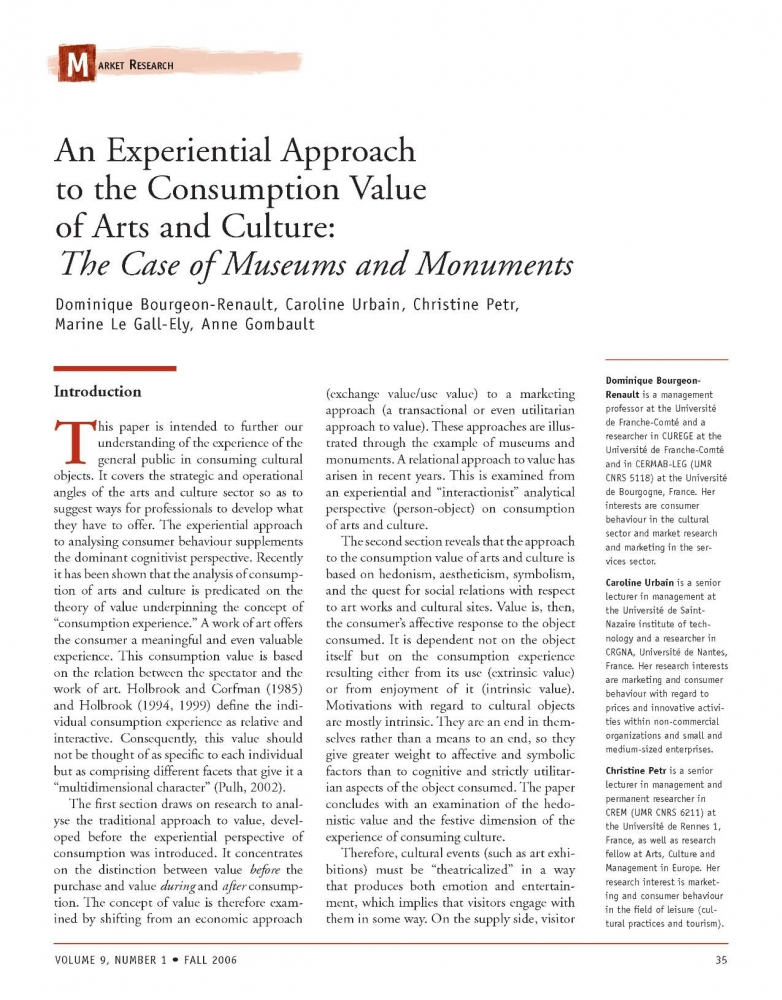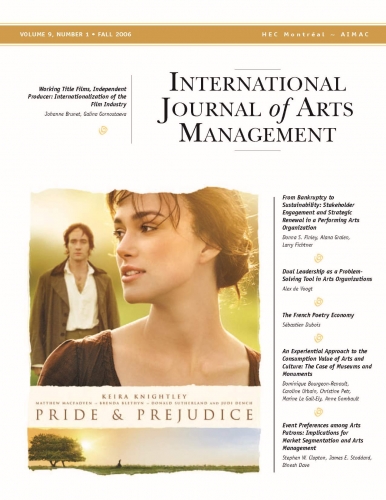An Experiential Approach to the Consumption Value of Arts and Culture: The Case of Museums and Monuments
Product: Article
$21.00 CA
Dominique Bourgeon-Renault, Caroline Urbain, Christine Petr, Marine Le Gall-Ely, Anne Gombault
Dominique Bourgeon-Renault is a management professor at the Université de Franche-Comté and a researcher in CUREGE at the Université de Franche-Comté and in CERMAB-LEG (UMR CNRS 5118) at the Université de Bourgogne, France. Her interests are consumer behaviour in the cultural sector and market research and marketing in the services sector.
Caroline Urbain is a senior lecturer in management at the Université de Saint-Nazaire institute of technology and a researcher in CRGNA, Université de Nantes, France. Her research interests are marketing and consumer behaviour with regard to prices and innovative activities within non-commercial organizations and small and medium-sized enterprises.
Christine Petr is a senior lecturer in management and permanent researcher in CREM (UMR CNRS 6211) at the Université de Rennes 1, France, as well as research fellow at Arts, Culture and Management in Europe. Her research interest is marketing and consumer behaviour in the field of leisure (cultural practices and tourism).
Marine Le Gall-Ely is a senior lecturer in management and a researcher in LESSOR (team 2614) at the Université de Rennes 2, France. Her research interests are non-marketable goods and services and durable and ethical consumption.
Anne Gombault is professor of management and organizational behaviour at the Bordeaux Ecole de Management in France. She is founder and chair of Arts, Culture and Management in Europe. Her research interests are organizational identity and museum management.
ABSTRACT
This article is intended to enhance our understanding of the consumer experience within the cultural domain. The analysis of arts and culture consumption is based on a paradigm founded on the theory of value, which, in turn, underlies the notion of the consumer experience. By investigating the field of museums and monuments, the authors validate this experiential approach to the consumption value of arts and culture. They recommend that, since a theatrical setting elicits emotional and ludic reactions in individuals and entails visitor participation, attendance at museums and monuments could be increased by means of “theatricalizing” – or adding a show-oriented dimension to the consumer experience.
KEYWORDS
Theory of value, consumption of culture, experiential approach to value
RÉSUMÉ
L’article a pour objectif d’approfondir la compréhension de l’expérience vécue par le public à travers la consommation d’un objet culturel. L’analyse de la consommation culturelle repose sur un paradigme se fondant sur la théorie de la valeur qui sous-tend la notion d’expérience de consommation. En prenant comme champ d’investigation celui des musées et des monuments, les auteures confirmeront cette approche expérientielle de la valeur de la consommation culturelle. En conséquence, les professionnels doivent proposer une mise en scène « théâtralisée » qui suscite des réactions émotionnelles et ludiques de la part des individus et qui implique une participation des visiteurs. Du côté de l’offre, afin d’accroître la fréquentation des lieux culturels, il s’agit de créer cette théâtralisation en donnant une dimension de « spectacle » à l’expérience à vivre par les individus, lors de leur consommation.
MOTS CLÉS
Théorie de la valeur, consommation culturelle, approche expérientielle de la valeur
RESUMEN
El presente artículo se propone profundizar la comprensión de la experiencia que vive el público a través del consumo de un objeto cultural. El análisis del consumo cultural se apoya en un paradigma procedente de la teoría del valor que subyace a la noción de experiencia de consumo. Los museos y monumentos son el campo de investigación escogido en este trabajo para confirmar la dimensión experiencial del valor del consumo cultural. Visto en estos términos, los profesionales necesitan proponer al público una puesta en escena “teatralizada” capaz de provocar reacciones emocionales y lúdicas en los individuos, de tal manera que los visitantes sientan que participan del evento cultural. Para fomentar la visita de los sitios culturales, los responsables de la oferta cultural deben crear esa teatralización otorgando a esa experiencia de consumo que viven los individuos una dimensión de “espectáculo”.
PALABRAS CLAVE
Teoría del valor, consumo cultural, dimensión experiencial del valor

